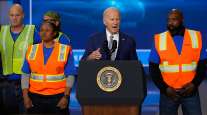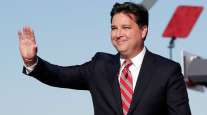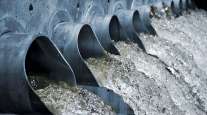Senior Reporter
FHWA Nominee: Tolls, P3s Options to Fund Infrastructure Projects

Tolling systems and public-private partnerships are viable alternatives to traditional sources of infrastructure funding, such as revenue generated from fuel taxes, the nominee to lead the country’s vast network of highways told a Senate panel on Oct. 5.
Former Iowa transportation chief Paul Trombino, selected to run the Federal Highway Administration, echoed Transportation Secretary Elaine Chao in insisting states should be presented with myriad funding options to fix large-scale infrastructure projects.
Trombino was nominated by President Donald Trump. A vote on his nomination has yet to be scheduled.
Speaking before the Senate Environment and Public Works Committee, Trombino acknowledged more than two dozen states had raised taxes on fuel to boost transportation accounts, but stopped short of endorsing the strategy at the federal level. Congress has not passed a gas tax hike since 1993. The federal tax on diesel is 24.4 cents per gallon and 18.4 cents on gasoline.
In 2015, Iowa’s governor enacted a 10-cent-per-gallon tax increase on diesel fuel and gas. That year, South Dakota, Utah, Georgia, Idaho, Nebraska and Washington also raised their fuel taxes.
“Every state is a little bit different. Their rural needs and urban needs are different and providing tools that allow them to implement projects that allows them to maximize their dollars for a specific project is really the key ingredient for them,” Trombino told senators considering his nomination. “Tolls work in some states and tolls don’t work in some states. And that’s true in the tools, too. Just as I would say P3s work in some states — it’s a good tool — in some areas they don’t work.”

Sen. Tom Carper (D-Del.) at the hearing. (Environment and Public Works Committee via YouTube)
Most of the senators at the hearing expressed concern about federal funding levels for highway programs. Committee ranking Democrat, Sen. Tom Carper of Delaware, noted his colleagues are asking the administration for details about an infrastructure funding proposal which should have been delivered during Trump’s first 100 days in office.
“I believe it is worth it to invest in a safe, reliable and modern transportation system, and I look forward to working with you and others on creative ways to address our long-term transportation needs in a fiscally responsible way,” said Carper, who emphasized the enormity involved in modernizing and rebuilding crumbling infrastructure.
The senator, who is among the few members of Congress calling for a fuel tax increase, also noted this year the American Society of Civil Engineers issued a D+ grade for the country’s system of roads, pipelines, bridges, tunnels, railways, canals and airports.
On safety concerns, Trombino pledged to prepare an update for Sen. Kirsten Gillibrand (D-N.Y.) about safety proposals related to underride guards.
A 2015 National Highway Traffic Safety Administration proposed rule not yet finalized called for motor carriers to strengthen rear underride guards. Federal regulations require tractor-trailers to be equipped with underride guards on their rears, but not on their sides.
Underride happens when vehicles crash into a truck, going completely or partially underneath it. Such impact raises the potential for serious injuries to the passengers in the smaller vehicle.
Trombino was formerly the president of the American Association of State Highway and Transportation Officials. That organization expressed deep support for his nomination.
“Paul has been an important leader in transportation for many years. His emphasis on transportation as a key part of economic development, particularly the movement of freight and goods in a global economy, has helped frame national policy and investments,” said Bud Wright, AASHTO executive director.
If confirmed, he would succeed FHWA Acting Administrator Brandye Hendrickson.




